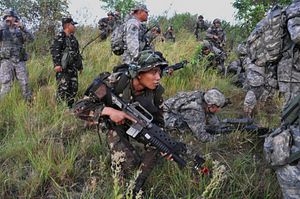This week, the Philippine Department of National Defense (DND) confirmed that the Philippines had begun receiving an order of towed howitzers from Israeli company Elbit Systems, with more on the way. The confirmation is yet another manifestation of the growing defense partnership between the two countries.
The Philippines and Israel have been making inroads in the defense realm over the past few years, including through several procurement deals. Over the years, the Armed Forces of the Philippines (AFP) has placed orders for a range of equipment, including missile systems and radars, from several Israeli firms.
Elbit itself won its first contract in the Philippines for the supply of upgraded armored personnel carriers to the Philippine military back in June 2014. The upgrade included 25mm unmanned turrets, 12.7 mm remote controlled weapon stations (RCWS) and fire control systems (FCS) for 90 mm turrets.
On June 8, DND’s public affairs office chief Arsenio Andolong revealed that the Philippines has begun receiving towed howitzers from Israel. The ongoing transaction is the outcome of a deal believed to be reached back in 2015 with Elbit Systems for PHP 438.62 million that includes 240 155-mm high explosive shells and integrated logistics support.
According to Andolong, three of the 12 155-mm M-71 artillery system had arrived in late April and were accepted by the Philippine Marine Corps (PMC), whose gunners are in the process of familiarizing themselves with the weaponry. He also disclosed that nine others were in transit, and that after they undergo standard technical inspections, three of them will be given to the PMC, while six would be given to the Army Artillery Regiment.
Andolong did not disclose any specifics about what the towed howitzers would be used for. But the Philippine security forces have recently been stepping up efforts to combat insurgency and terrorism in the southern part of the country under Philippine President Rodrigo Duterte (See: “US Terror Aid to Philippines Signals Enduring Defense Ties Under Duterte”).
The development also illustrates that for all of Duterte’s posturing regarding forging relationships with new partners like China and Russia, so far the AFP in fact continues to rely on most of its traditional suppliers for actual equipment and tangible cooperation. How this balance evolves and how it impacts the future of Philippine military modernization during the remainder of Duterte’s single six-year term, if at all, will be something to watch (See: “What’s Next for Philippine Military Modernization Under Duterte?”).
































